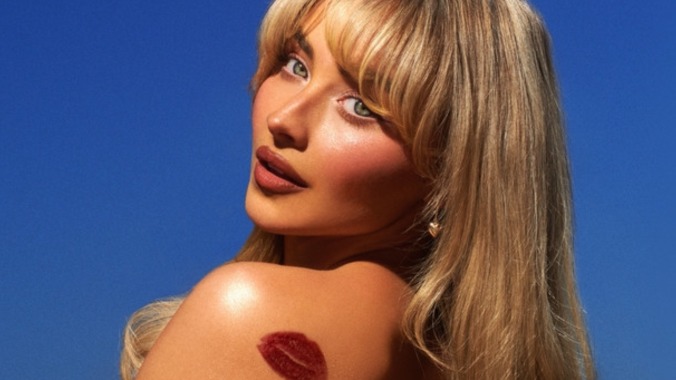What Sabrina Carpenter Lacks in Originality, She Makes Up For in Personality on Short n’ Sweet
Hot off a string of singles that elevated her from all-grown-up Disney kid to chart-topping superstar, Carpenter’s sixth album demonstrates pop princess potential in great moments that don’t necessarily add up to a great record.

Sabrina Carpenter’s rise to full-fledged pop stardom is one of the year’s most massive level-ups, exceeded only by Chappell Roan, who, like Sabrina, was bolstered by an opening slot on an A-List artist’s tour. While both Sabrina and Chappell both spent years releasing music to varying levels of niche but devoted “middle class” pop audiences before 2024, Carpenter’s ascent follows her Disney Channel-backed come-up, making her success more conventional and precedented than that of the Midwest Princess.
In many ways, Sabrina Carpenter has spent the past few years unfairly stuck in the shadow of another former Disney kid’s success story. This time last year, my own knowledge of Carpenter started with a vague understanding that she was the infamous “blonde girl” that Olivia Rodrigo sang about on “drivers license,” and ended with recognizing her from a music video where she’s riding a bike and talk-singing about an oat milk latte. Or something like that. Following this, she began popping up on my TikTok feed—videos of her on-stage, ab-libbing raunchy, locality-specific outros to her song “Nonsense” with impressive quantity and quality.
In the past few months though, she’s become impossible to ignore, in large part due to (or should I say “Mountain Dew to?”) (I absolutely shouldn’t) her breakout hit “Espresso.” Memes aside, when the “Espresso”-inspired think-pieces began pouring in, touting Short n’ Sweet‘s lead single as an injection of new energy into pop music’s increasingly predictable zeitgeist, I wondered if there was something I was missing every time I heard “Espresso” at a bar or a grocery store or in the back of an Uber. Reports of its originality seemed greatly exaggerated; it really just sounds like a rehash of Doja Cat’s “Say So”—a song that, for most of us, is like taking a pill that transports you straight back to spring of 2020, an era that no one is eager to be reminded of. Still, at this point I suspect that I’ve been Stockholm Syndromed into liking “Espresso” after hearing it literally everywhere, because now I can’t stop wandering around my apartment absentmindedly mumbling to myself “I’m working late / ‘Cause I’m a singerrrr.”
Though “Espresso” is the more ubiquitous single and the true breakout, its follow-up “Please, Please, Please” was the one that earned Carpenter her first #1 hit—and it’s the superior song. Its roller disco-meets-rodeo sparkle shines through at the sweet-and-sour chorus (even if I’ve become unable to hear Carpenter’s deep, twangy pronunciation of “motherfucker” without being reminded of Lana Del Rey’s burbling delivery of “Walk into the room you know you made my eyes burn” during her infamous SNL performance of “Blue Jeans”). Carpenter’s delivery is like Lana’s if she’d actually stuck the landing.
Short n’ Sweet is front-loaded, coming in white-hot with “Taste,” as Carpenter sings over teasing guitar licks and opens the album by winking at both her record’s title and at her diminutive stature: “Oh, I leave quite an impression / Five feet, to be exact.” “The bubbly, glam-pop opener has the album’s catchiest chorus and bridge, as well as the most star-making, personality-packed vocal performance of Carpenter’s career thus far. She’s no stranger to high-profile love triangles, or to using them as inspiration for her music (“because i liked a boy” was her rebuttal to being unfairly cast as the villain by a faceless public when she became embroiled in the celebrity gossip saga that fueled the fervor around Olivia Rodrigo’s debut album, Sour).
On “Taste,” she makes the best of this tabloid-and-songwriting fodder, amping up the drama with a goofy, gory Death Becomes Her-parodying music video co-starring Jenna Ortega—and lyrics like “He’s funny now all his jokes hit different / Guess who he learned that from?” which, on a meta-referential level, give the listener a sense of—dare I say déjà vu? With a healthy dose of both silliness and self-awareness, she capitalizes on the public narrative without forgoing its central relatability or leaning too heavily into the Easter Eggification of personal pop music. Less lethal but still intriguing is “Sharpest Tool,” which embeds quippy lines like “We never talk about how you found God at your ex’s house / Always made sure that the phone was face down / Seems like overnight I’m just a bitch you hate now” into a piece of intimate, Postal Service-reminiscent techno—a surprising and welcome turn from Carpenter. The way the line “We never talk about it” seems to float atop an exhale puts her breathy soprano to stunning use.
-

-

-

-

-

-

-

-

-

-

-

-

-

-

-

-

-

-

-

-

-

-

-

-

-

-

-

-

-

-

-

-

-

-

-

-

-

-

-

-








































